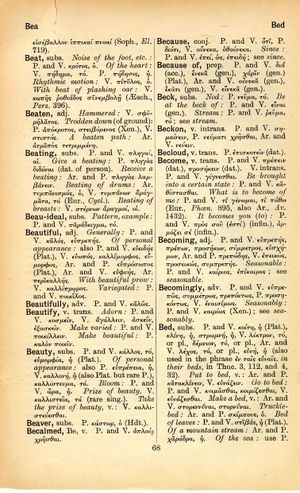become: Difference between revisions
From LSJ
ἡγούμενος τῶν ἡδονῶν ἀλλ' οὐκ ἀγόμενος ὑπ' αὐτῶν → of his pleasures he was the master and not their servant
m (Text replacement - "<b class="b2">A</b>" to "A") |
m (Woodhouse1 replacement) |
||
| Line 1: | Line 1: | ||
{{Woodhouse1 | {{Woodhouse1 | ||
|Text=[[File:woodhouse_68.jpg|thumb|link={{filepath:woodhouse_68.jpg}}]] | |Text=[[File:woodhouse_68.jpg|thumb|link={{filepath:woodhouse_68.jpg}}]] | ||
===verb transitive=== | |||
P. and V. πρέπειν (dat.), προσήκειν (dat.). | [[prose|P.]] and [[verse|V.]] [[πρέπειν]] (dat.), [[προσήκειν]] (dat.). | ||
===verb intransitive=== | |||
[[prose|P.]] and [[verse|V.]] [[γίγνομαι]], [[γίγνεσθαι]]. | |||
[[be brought into a certain state]]: [[prose|P.]] and [[verse|V.]] [[καθίστασθαι]]. | |||
[[what is to become of me]]: [[prose|P.]] and [[verse|V.]] [[τί γένωμαι]], [[τί πάθω]] ([[Euripides|Eur.]], Phœn. 895, also [[Aristophanes|Ar.]], Av. 1432). | |||
[[it becomes you]] (to): [[prose|P.]] and [[verse|V.]] [[πρὸς σοῦ]] ([[ἐστί]]) (infin.), [[ἁρμόζει]] σέ (infin.). | |||
}} | }} | ||
Revision as of 08:52, 20 May 2020
English > Greek (Woodhouse)
verb transitive
P. and V. πρέπειν (dat.), προσήκειν (dat.).
verb intransitive
P. and V. γίγνομαι, γίγνεσθαι.
be brought into a certain state: P. and V. καθίστασθαι.
what is to become of me: P. and V. τί γένωμαι, τί πάθω (Eur., Phœn. 895, also Ar., Av. 1432).
it becomes you (to): P. and V. πρὸς σοῦ (ἐστί) (infin.), ἁρμόζει σέ (infin.).

